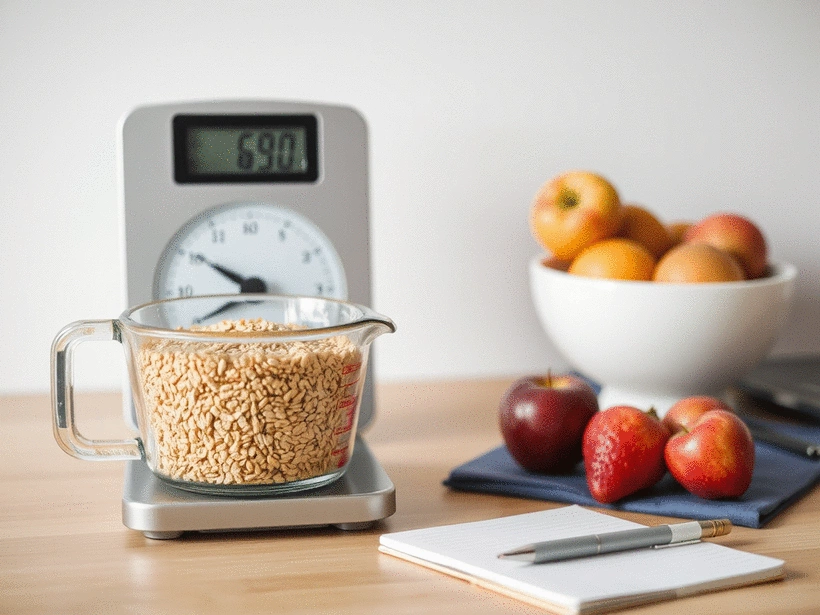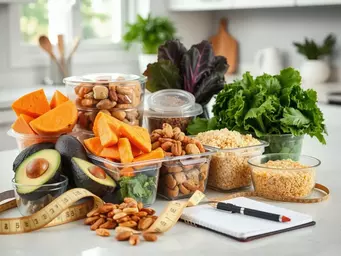Calculate Daily Calories for Weight Gain

Are you ready to embark on a journey toward healthy weight gain? Understanding your caloric needs is the first step to achieving your goals effectively and sustainably. Let’s explore the key insights you'll gain from this enlightening article!
What You Will Learn
- Calculating your caloric needs is essential for preventing unwanted fat gain and promoting muscle growth.
- Understanding BMR and TDEE helps tailor your diet and exercise regime for optimal weight gain.
- A caloric surplus of 250 to 500 calories per day is recommended for steady weight gain.
- Choosing nutrient-dense foods is crucial for overall health and supports sustainable weight gain.
- Tailoring your approach based on individual needs ensures that everyone can achieve their weight gain goals healthily.
Key Concepts for Healthy Weight Gain
Achieving healthy weight gain involves understanding fundamental principles and making informed dietary choices. Below are key concepts and practices to guide your journey.
Understanding Caloric Needs
Knowing your BMR (Basal Metabolic Rate) and TDEE (Total Daily Energy Expenditure) is crucial for setting effective weight gain goals. It’s not just about eating more, but eating smart.
Energy Balance & Surplus
To gain weight, consume 250-500 more calories than you burn daily. Focus on consistent, gradual increases rather than drastic changes for sustainable results.
Nutrient-Dense Options
Prioritize whole foods like nuts, seeds, avocados, and lean proteins. These provide essential nutrients for muscle growth and overall health, not just empty calories.
Special Populations
Weight gain strategies should be tailored for athletes, older adults, or individuals with medical conditions. Consult professionals for personalized dietary recommendations.
Understanding the Importance of Caloric Needs in Healthy Weight Gain
Are you aware that understanding your caloric needs is vital for achieving healthy weight gain? Many people overlook this fundamental aspect, but it’s true! Knowing how many calories your body needs can set the foundation for your weight gain journey. It’s not just about eating more; it's about eating smart.
When we talk about weight gain, it's essential to focus on the quality of the calories we consume. By calculating your needs, you can ensure you are providing your body with the right energy and nutrients. This helps prevent unwanted fat gain and promotes muscle growth, which is crucial for a healthier physique!

Why Calorie Calculation Matters for Weight Gain Goals
Our bodies are like vehicles—they need fuel to run efficiently! For your weight gain goals, calculating your calorie intake helps you understand how much energy you need to consume to gain weight healthily. Here’s why it matters:
- Prevents Overeating: Knowing your caloric needs helps you avoid excessive eating, which can lead to unwanted fat gain.
- Supports Muscle Growth: A precise caloric surplus ensures that you’re not just gaining weight but building lean muscle.
- Promotes Sustainable Gains: Understanding your intake helps you make long-term changes instead of quick fixes.
Tracking your calories may seem daunting, but I promise it’s less overwhelming once you get the hang of it! Taking control of your caloric intake can be empowering and will help set you up for success in your weight gain journey. For more detailed information on calorie calculation and its importance, you can consult resources like the Mayo Clinic's guide to calorie calculators.
Defining Daily Calorie Needs: BMR and TDEE Explained
To truly grasp your caloric needs, it’s crucial to understand two key terms: BMR (Basal Metabolic Rate) and TDEE (Total Daily Energy Expenditure). Simply put, your BMR is the number of calories your body requires at rest to maintain basic functions. It’s like the energy your body uses to keep your heart beating and your organs functioning, even when you’re just chilling on the couch!
- BMR: The energy needed for basic bodily functions.
- TDEE: The total calories you burn in a day, including all activities.
By understanding these concepts, you can tailor your diet and exercise regime effectively. For example, if your BMR is 1,500 calories and your TDEE is 2,500 calories, you’ll need to create a caloric surplus above your TDEE for weight gain. The National Academy of Sports Medicine provides a calorie calculator that can help you determine these numbers.
Exploring Energy Balance: The Role of Caloric Surplus in Weight Gain
Energy balance is a fundamental principle in nutrition: it’s all about the calories in versus the calories out. To gain weight, you need to be in a caloric surplus, which means consuming more calories than you burn. Here’s how it works:
- Caloric Surplus: Aim for a surplus of 250 to 500 calories per day for steady weight gain.
- Track Progress: Regularly monitor your weight and adjust calorie intake as necessary.
- Focus on Quality: Prioritize nutrient-dense foods like nuts, avocados, and whole grains!
Remember, weight gain doesn’t happen overnight. It’s a gradual process, and by focusing on a sustainable caloric surplus, you’ll see progress that lasts. I’m here to support you with tips and resources to make this journey enjoyable and effective!
Pro Tip
To truly optimize your weight gain journey, consider meal prepping! Planning your meals ahead of time ensures you have calorie-dense, nutrient-rich options readily available, making it easier to hit your caloric goals without the stress of last-minute decisions.
Frequently Asked Questions
Q1: Why is understanding caloric needs so important for healthy weight gain?
A1: Understanding your caloric needs is crucial because it helps you consume the right amount of energy to gain weight effectively without accumulating excessive fat. It also ensures you're providing your body with adequate nutrients to support muscle growth and overall health.
Q2: What are BMR and TDEE, and how do they relate to weight gain?
A2: BMR (Basal Metabolic Rate) is the calories your body burns at rest to maintain essential functions. TDEE (Total Daily Energy Expenditure) is the total calories you burn in a day, including all physical activities. To gain weight, you need to consume more calories than your TDEE, creating a caloric surplus.
Q3: How large of a caloric surplus is recommended for steady weight gain?
A3: For steady and sustainable weight gain, it is recommended to aim for a caloric surplus of 250 to 500 calories per day above your TDEE.
Q4: Why should I focus on nutrient-dense foods instead of just any high-calorie foods?
A4: Focusing on nutrient-dense foods ensures that while you're increasing your calorie intake, you're also providing your body with essential vitamins, minerals, and macronutrients. This supports overall health, muscle growth, and prevents the health issues associated with consuming empty calories.
Q5: How can I tailor my weight gain strategy if I'm an athlete or an older adult?
A5: Athletes may require higher protein and carbohydrate intake to support their intense training and recovery. Older adults might need more nutrient-dense foods to counteract age-related muscle loss. It's best to consult with healthcare providers or nutrition professionals for personalized dietary recommendations based on your specific needs and medical conditions.
Ensuring Sustainable Weight Gain Through Healthy Practices
When it comes to gaining weight, it’s not just about calories; it’s also about the quality of those calories. Choosing nutrient-dense options can make a significant difference in your journey. As I often tell my clients at Ways to Gain Weight, focusing on the right foods not only helps you gain weight but also supports your overall health.
Incorporating whole foods that are rich in vitamins and minerals can help you build muscle and improve your energy levels. Think of foods like leafy greens, whole grains, and healthy fats. These choices provide essential nutrients that your body needs as you increase your caloric intake. Let’s explore some key practices that can guide you toward sustainable weight gain.

The Importance of Food Quality: Choosing Nutrient-Dense Options
Not all calories are created equal! While you may need to eat more to achieve your weight gain goals, the types of foods you choose are crucial for your health. Here’s why nutrient-dense foods are essential:
- Energy and Nutrients: Foods like nuts, seeds, and avocados are high in calories and packed with nutrients.
- Muscle Building: Lean proteins, such as chicken and fish, help repair and build muscle tissue.
- Overall Health: Whole foods support your immune system and keep your body functioning optimally. For a deeper dive into the science behind nutrition and metabolism, the National Center for Biotechnology Information (NCBI) offers comprehensive studies on these topics.
When I work with clients, I emphasize that nutrient-dense foods will help you feel fuller and more satisfied, leading to more sustainable weight gain. It’s about creating a balanced diet that fuels your body and supports your goals.
Considerations for Special Populations: Tailoring Approaches for Everyone
Everyone's journey to weight gain is unique, and it’s essential to tailor your approach based on your individual needs. For example:
- Athletes: May need higher protein and carbohydrate intake to support their training and recovery.
- Older Adults: Might require more nutrient-dense foods to combat age-related muscle loss.
- Individuals with Medical Conditions: Should consult healthcare providers for specific dietary recommendations.
At Ways to Gain Weight, I understand that these considerations can significantly impact how you approach your weight gain journey. Tailoring your dietary choices based on your unique situation ensures that you gain weight healthily and sustainably.
Understanding Dietary Guidelines for Healthy Weight Management
Following established dietary guidelines can be a great way to ensure you’re on the right path. These guidelines typically include:
- Diverse Diet: Incorporate a variety of food groups to meet your nutritional needs.
- Portion Control: Even when you're trying to gain weight, be mindful of portion sizes to avoid discomfort.
- Hydration: Don’t forget to drink enough fluids, as hydration plays a vital role in overall health.
By adhering to these principles, you’ll be setting yourself up for success. Remember, sustainable weight gain isn’t just a number on the scale; it’s about building a healthy lifestyle that you can maintain long-term.
Next Steps for Achieving Your Weight Gain Goals
Now that you understand the importance of healthy practices in your weight gain journey, it’s time to take actionable steps. Let’s delve into how to create a personalized plan that will help you achieve your goals effectively!
Recap of Key Points
Here is a quick recap of the important points discussed in the article:
- Understand Caloric Needs: Knowing your caloric needs is crucial for healthy weight gain and muscle growth.
- Calculate BMR and TDEE: Knowing your Basal Metabolic Rate (BMR) and Total Daily Energy Expenditure (TDEE) helps you tailor your caloric intake.
- Focus on Nutrient-Dense Foods: Prioritize whole foods rich in nutrients to gain weight healthily.
- Maintain a Caloric Surplus: Aim for a surplus of 250 to 500 calories per day for steady weight gain.
- Track Progress: Regularly monitor your weight and adjust your caloric intake as needed.
- Tailor Your Approach: Consider individual needs based on your lifestyle, age, and any medical conditions.



